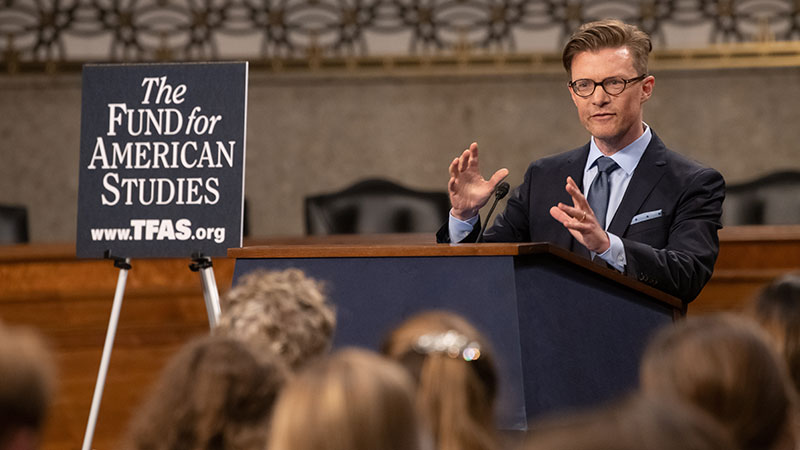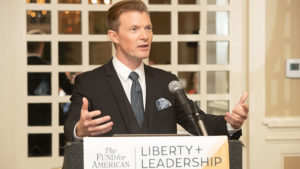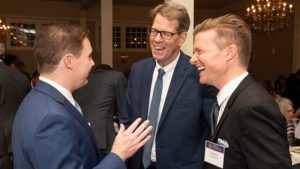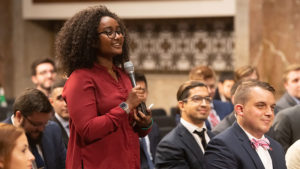
Is Sweden a socialist country? And is it being portrayed accurately by supporters of democratic socialism in the United States? Swedish author Johan Norberg joined nearly 200 TFAS students for a webinar on Tuesday, June 23, to answer these questions and share his “Lessons From Sweden” on the failed socialist policies in his home nation.
Norberg served as the 2020 TFAS Virtual Summer Neal B. Freeman Lecture featured speaker, addressing students across all program tracks. The annual TFAS Neal B. Freeman Lecture is sponsored by businessman and award-winning television producer, TFAS Trustee Emeritus Neal B. Freeman. For six years, Freeman’s lecture series has brought effective and engaging speakers to discuss the principles of a free society, free markets, personal responsibility and virtue.

TFAS President Roger Ream ’76 opened the presentation by acknowledging Freeman’s continued commitment to shaping the lives of rising generations through his generous contributions to TFAS programs.
“I want to thank Neal Freeman for enabling us to bring an outstanding individual to speak each summer to the students attending the TFAS programs, and this year is no exception,” Ream said. “We are most grateful to Neal for his generous gift to establish this all-institute lecture.”
A senior fellow at the Cato Institute and author of several books, Norberg shared remarks with students from his home in Stockholm, Sweden, providing a firsthand look at life during the coronavirus pandemic in the only country that did not close its economy.
This is the place where we had politicians who said that it would be an insufferable dismantling of civil liberties and it would be too costly for people, for the economy and for public health in the long-run to shutdown.” – Johan Norberg
“Sweden did not close borders, businesses, schools, public transportation, gyms or bars,” Norberg said. “This is the place where we had politicians who said that it would be an insufferable dismantling of civil liberties and it would be too costly for people, for the economy and for public health in the long-run to shutdown.”
Norberg also gave students a lesson in Swedish history and explained how, despite being used as an example of socialism’s success, Sweden has embraced capitalism since the 1980s, and is often portrayed incorrectly by democratic socialists in America.

“Sweden is not what it is often portrayed as in the American debate, as a big government socialist country where the government tells everybody how to live their lives,” Norberg said. “That’s something that we often hear about from the U.S. leftists who say that America should be more like Sweden.”
Norberg pointed out that Sweden’s experiment with socialism in the 1980s almost destroyed the once prosperous nation. Detailing the rise, fall and rebirth of the Swedish model, Norberg explained that as its growth rate increased between 1870 and 1970, Sweden went from being one of Europe’s poorest countries to the 4th richest country in the world.
“There was nothing mysterious about this progress,” Norberg said. “In 1950, Sweden was also the fifth freest economy in the world.”
He cited historical data to explain how between 1970 and 1995, politicians began redistributing wealth in the country and public spending doubled from 30 to 60 percent. Business and labor market regulations were implemented and Swedish citizens began to realize that these socialist policies were not what made Sweden as prosperous as it was over the last century.
Free markets made us rich. And socialism almost destroyed it.” – Johan Norberg
“Here was a small democratic country that seemingly proved that socialism and wealth could be combined, because we doubled public spending and we were still incredibly rich,” Norberg explained. “But these policies that we implemented when we were that rich were the opposite of what got Sweden there in the first place, and it almost destroyed us.”

After this failed socialist experiment, the Swedish model was reborn through free-market reforms. Norberg believes that Sweden’s history serves as a prime example of why economic freedom is essential to prosperity.
“Free markets made us rich,” Norberg said. “And socialism almost destroyed it.”
After the presentation, students engaged in an exclusive Q&A discussion with Norberg, where he shared more on how we can learn from Sweden’s failed experiment with socialism and why the U.S. should not be “more like Sweden.”
Learn more from Norberg and watch his full address to the students here:

